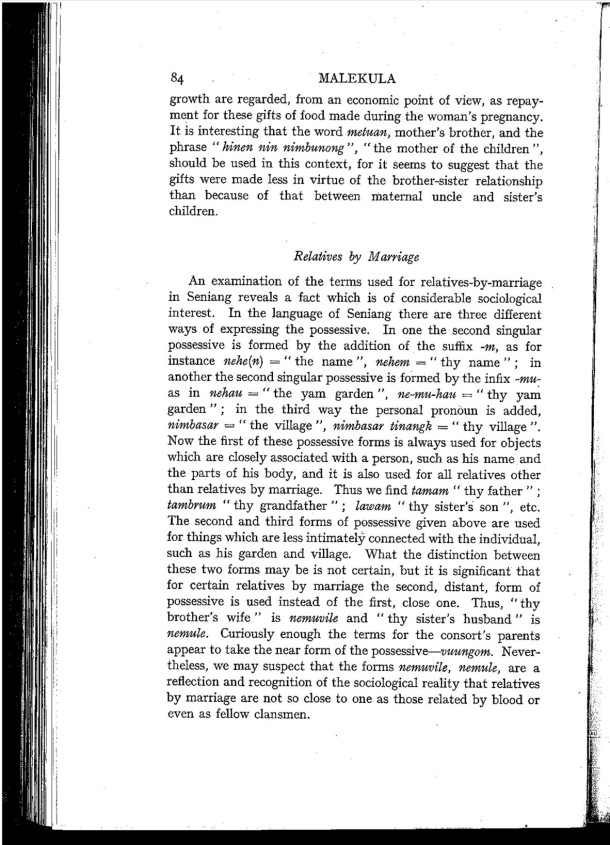|
|  [Note: this transcription was produced by an automatic OCR engine]
, T"
84 . MALEKULA
growth are regarded, from an economic point of view, as repay-
ment for these gifts of food made during the woman's pregnancy.
It is interesting that the word met-mm, mother’s brother, and the
phrase “ hinen m'n m‘-wibummg ", "the mother of the children â€ù,
should be used in this context, for it seems to suggest that the
gifts were made less in virtue of the br0ther~sister relationship
than because of that between maternal uncle and sister's
children.
Relatives by Marriage
An examination of the terms used for relatives-by-marriage
in Seniang reveals a fact which is of considerable sociological
interest. In the language of Seniang there are three different
ways of expressing the possessive. In one the second singular
possessive is formed by the addition of the sufï¬Åx -m, as for
instance nehe(n) = “ the name ", nehem = “ thy name " ; in
another the second singular possessive is formed by the inï¬Åx -mu;
as in nehau = " the yam garden â€ù, ne-mu-hau = “ thy yam
gardenâ€ù; in the third way the personal pronoun is added,
nimbasar = “ the village ", nimbasar timmgk = "thy village â€ù.
Now the ï¬Årst of these possessive forms is always used for objects
which are closely associated with a person, such as his name and
the parts of his body, and it is also used for all relatives other
than relatives by marriage. Thus we ï¬Ånd tamam " thy father " 1
tambrum “ thy grandfather "; laumm "thy sister's son â€ù, etc.
The second and third forms of possessive given above are used
for things which are less intimately connected with the individual,
such as his garden and village. What the distinction between
these two forms may be is not certain, but it is signiï¬Åcant that
for certain relatives by marriage the second, distant, form oi
possessive is used instead of the ï¬Årst, close one. Thus, "thy
brother's wife â€ù is nemuvile and "thy sister's husbandâ€ù is
nemule. Curiously enough the terms for the consort's parents
appear to take the near form of the possessive—vuungom. Never-
theless, We may suspect that the forms nemuvile, nemule, are a
reflection and recognition of the sociological reality that relatives
by marriage are not so close to one as those related by blood or
cvcn as fellow clansmen.
PM 7--_._
|